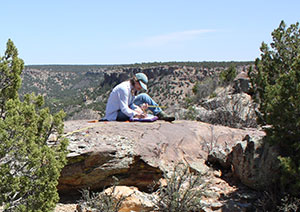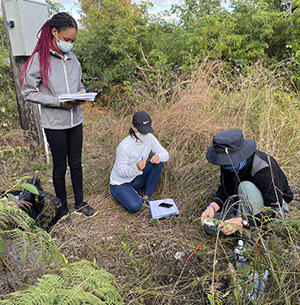
A University of Wyoming researcher and two colleagues from the University of The Bahamas are gathering data to evaluate community perspectives about forest recovery efforts two years after a devastating Category 5 storm hit parts of the Commonwealth of the Bahamas and caused mass destruction.
Elizabeth Lynch, a UW Department of Anthropology postdoctoral researcher, is leading the project titled “Citizen Science Forest Recovery and Community Perspectives on Post-Hurricane Dorian Grand Bahama.” She is collaborating with Nicolette Bethel, a social anthropologist, and Clare Bowen-O’Connor, a plant ecophysiologist, both from the University of The Bahamas (UB).
They will conduct research on Grand Bahama in the northernmost area of the islands in the Bahamian archipelago, located east of Florida and west of the Great Abaco islands.
The project received $62,282 from the Natural Infrastructure for Caribbean Resilience Program, which is funded by the U.S. Department of State and administered by the U.S. Forest Service. The team also received $5,000 from the CGS International Research Grant Fund for preliminary collaborative research.
“The significance of this project is the collaborative nature and focus on the integration of community input into ongoing ecosystem recovery activities,” Lynch says. “Our project brings together Bahamian communities, international and local students and researchers, and governing authorities.”
In September 2019, Hurricane Dorian -- the most intense storm on record in the Bahamas -- devastated the island’s natural vegetation composed of pine, coppice and mangrove forests. Homes, commercial buildings, utilities and infrastructure including roads, docks and airports also were destroyed, particularly in the settlements of Freeport and East End Grand Bahama. Most of the forest resources on Grand Bahama (70,289 acres) suffered catastrophic damage due to hurricane-force winds and saltwater intrusion.
The collaborative research project incorporates the concepts of spatial justice.
“For instance, in circumstances where people are displaced from homes and communities, their voices need to be included in decision-making to allow for more equitable and resilient responses to climatic change throughout the Bahamian archipelago,” Lynch says. “The project builds collaborative engagement with other researchers working on a range of recovery projects on the island.”

She mentions Kristen Welsh-Unwala, from UB, who conducts research on small island sustainability, and her student, Amber Turner. Turner is researching potable water resources such as preparation, recovery and perceptions in the wake of major hurricanes on Grand Bahama. The title of their project is “Strengthening of Forests through Groundwater Restoration” and is funded by the Bahamas Protected Areas Fund.
“Both researchers will be contributing to our project as we proceed,” Lynch says.
Lynch and her two UB colleagues will collect data on the attitudes toward the renewal of forest resources and determine the perspectives on climate change relating to the impacts of high-intensity storms on environmentally sensitive areas, such as in the Bahamas.
“The results of this research will provide a social impact analysis of post-Dorian forest recovery efforts and a long-term monitoring and maintenance strategy for these resources by the community,” she adds.
The project will be conducted in the forest reserve and conservation forests of Grand Bahama over a two-year period, followed by a long-term monitoring program supported by UB personnel and community members. The initial assessment will examine the recovery of the forested areas two years after the storm struck and will survey the present status of the communities impacted by Hurricane Dorian.
About 240 acres of forest reserve land was identified for restoration work in selected permanent plots that engage both UB students and neighboring community members, such as high school students, residents, nongovernmental organizations and local interest groups. UB plant science students will lead the collection of plant measurements as part of their coursework.
“We are in the process of constructing a plant nursery for the propagation of native plants to reforest areas devastated by Hurricane Dorian,” Bowen-O’Connor says. “In January, we assessed plant abundance and regeneration in established permanent plots in east Grand Bahama. We also quantified the pinewood volume to determine the potential economic value of pine trees within the groundwater wellfields boundaries.”
UW researchers will lead the ethnographic -- a branch of anthropology and the systematic study of individual cultures that explores cultural phenomena -- study of the communities affected by Hurricane Dorian, with the goal of training UB students pursuing anthropology studies during the second year of the project.
Assisting Lynch are UW students Erin Woolley, a senior from Cody and a project research assistant; Lander sophomore Kenzie McPhie, a UW Honors College researcher; and Keaton Lovato-Hegdahl, a senior from Casper and a project volunteer.
For more information, email Lynch at elynch2@uwyo.edu.

